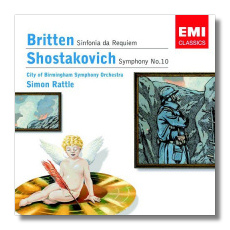
The Internet's Premier Classical Music Source
Related Links
- Latest Reviews
- More Reviews
-
By Composer
-
Collections
DVD & Blu-ray
Books
Concert Reviews
Articles/Interviews
Software
Audio
Search Amazon
Recommended Links
Site News
 CD Review
CD Review
EMI Encore

- Dmitri Shostakovich: Symphony #10 in E minor, Op. 93
- Benjamin Britten: Sinfonia da Requiem, Op. 20
Philharmonia Orchestra/Simon Rattle
City of Birmingham Symphony Orchestra/Simon Rattle
EMI Classics 586871-2 DDD 77:14
A 29-year-old Rattle recorded the Britten in 1984. The Shostakovich comes from 1985, just as his rise up the ladder of fame was really beginning to accelerate. (Thoughtfully, EMI identifies him as "Sir" on the inlay card and on the back of the booklet, although the "Sir" is missing on the booklet cover.)
The Shostakovich is not a favorite recording, even among Rattle's many admirers. Rattle's first movement is one of the slowest on disc. At random, I pulled five other CDs of this work off the shelves to compare timings. Fastest was De Preist on Delos (21:37), then Karajan I on DG (22:00), Skrowaczewski on IMP (22:14), Sanderling on Berlin Classics (24:20), and Inbal on Denon (24:42). Rattle's timing is 26:32. Parts of the movement are very poignant – its closing moments for example – and the climaxes have an appropriately abrasive power, but Rattle is unable to sustain the intensity, and the music sags. In the third movement, the comparison timings (in the same order) are 11:19, 11:16, 11:19, 12:39, and 12:28. Again, Rattle is slowest of all, at 13:02, and here his "power failure" is even more noticeable. On the plus side, the whirlwind second movement (supposedly a portrait of Stalin's malevolence) goes well, although Karajan I and Skrowaczewski are even faster. The glumly pastoral Andante opening to the last movement has atmosphere, and the succeeding Allegro is bright and cheerful, but when it comes time for the "DSCH" motif to reassert itself, Rattle plays it down too much. The Philharmonia's playing is disappointing here – particularly the violins, which sound haggard. Perhaps this is a function of the early digital recording. There are better versions of this symphony, but the price is attractive.
The Sinfonia da Requiem finds Rattle on firmer ground. Although it was written after the death of the composer's father, the Sinfonia has come to be associated with World War Two and the soldiers and civilians who perished in it. (It was composed in 1940 when Britten still was in his late 20s.) Rattle's most formidable competition in this work is the composer himself (Decca) and André Previn (also on EMI). Britten was a fine conductor, and his recording in many ways should be considered definitive. Previn gives the work a little more pizzazz, however, a trend continued by Rattle who demonstrates why he was such a crowd-pleaser in his Birmingham days. Without cheapening the Sinfonia, he emphasizes its pathos and drama more than the two aforementioned conductors.
With the caveat noted above, the early digital recording is good. The percussion instruments are allowed to make a realistic impact. As this is a budget "Encore" reissue, the booklet notes are so superficial as to be almost pointless. Given the price, though, this CD is worth having, but mostly for the Britten.
Copyright © 2006, Raymond Tuttle




















